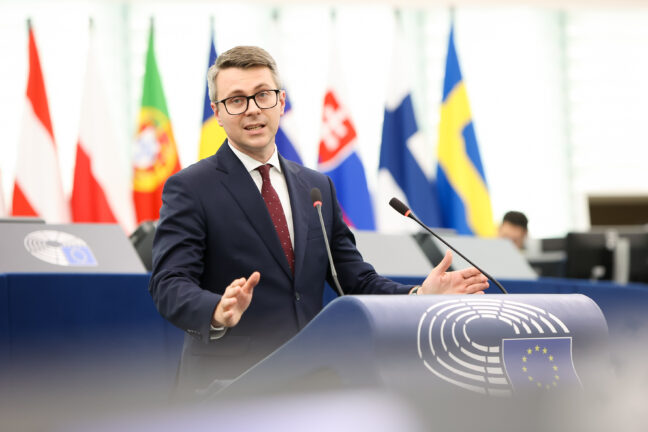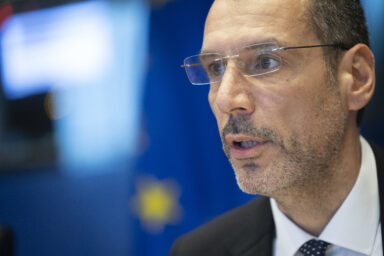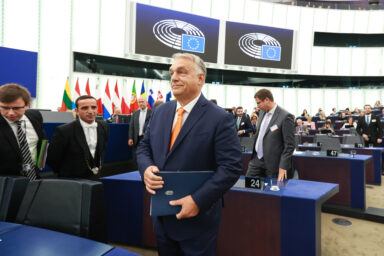The European Parliament’s Monday’s plenary debate on modernising public procurement rules has confirmed divisions along ideological lines between competing visions for how the bloc should spend €2tn of taxpayer money over the coming seven years.
The discussion, held in Strasbourg on 8 September 2025, centred on an initiative report urging the European Commission to overhaul 2014 directives critics call outdated and unfit for an era of economic uncertainty. All factions agreed the current system, fixated on securing the lowest price, is broken. However, sharp divides emerged over whether reforms should prioritise market efficiency, social safeguards, or geopolitical sovereignty.
Innovation versus bureaucracy
MEP Piotr Müller (ECR/POL), the rapporteur, framed the issue as a crossroads between innovation and bureaucracy. “Public procurement is by far too complex. It stifles innovation,” he argued, proposing six fixes: slashing red tape, digitising processes, boosting research funding, easing SME access, prioritising local farmers, and preserving member-state autonomy.
“We must allow public institutions to take risks without fearing lawsuits. Academia and SMEs lack the lawyers or capacity to navigate these labyrinths.” His emphasis on national flexibility drew cautious support from centrists but ire from left-wing factions demanding EU-wide labour and environmental mandates.
Stéphane Séjourné, Executive Vice-President for Prosperity and Industrial Strategy of the European Commission, called the current framework “complex, fragmented, and governed by the lowest price”. With €600bn of annual procurement subject to EU rules—triple the bloc’s budget—he pledged to “modernise” the system by simplifying procedures, leveraging digital tools, and embedding “sustainability, innovation, and social aspects” into bids. “We need a European procurement strategy,” he said, nodding to calls for “European preference” in strategic sectors. “Geopolitics demand we equip ourselves with a paradigm shift.”
You might be interested
Lowest price under fire
The lowest-price criterion faced multi-partisan scorn. MEP Kim van Sparrentak (Greens-EFA/NDL) noted €2tn could “make Europe thrive” if spent on green technologies and fair wages rather than “fuelling a race to the bottom.” Her Italian party colleague Anna Cavazzini pressed for mandatory social and environmental clauses: “Public money should never reward union-busting or pollution. This report is a start, but the Commission must be bolder.”
Hard-core leftists were even harsher in their condemnation. MEP Hanna Gedin (The Left/SWE) decried a system where “workers’ bent backs and deaths” enable profit-driven bids. “Why spend billions on exploiters? We need guarantees, not cynicism,” she said.
We need criteria that boost SMEs, supply chains, and sustainability. — MEP Marie-Pierre Vedrenne (Renew/FRA)
Sovereignty emerged as a flashpoint. Pierre Jouvet (S&D/FRA) framed procurement as a “weapon” against external threats. “Donald Trump’s America and China’s subsidies demand we prefer European suppliers. Why buy Vietnamese buses or U.S. software when we have the talent here?” His fellow French MEP Virginie Joron (PfE) cited lost contracts: “Czech nuclear plants, Portuguese metros are won by Koreans and Chinese. Our tools aren’t even translated into French. We need reciprocity and tech transfers.” Another French MEP (albeit with an Italian passport) Sandro Gozi (Renew/FRA) urged “European preference” to aid industry: “Decarbonise, digitise, and defend SMEs.”
Support for small businesses
SMEs found some rare consensus. Christian Doleschal (EPP/DEU) backed higher bidding thresholds to ease their burden: “Adjust the €5.5m cap for inflation—it should be €9.5m.” Mr Müller warned against “ill-understood subcontracting” that underpays small firms.
Laura Ballarín Cereza (S&D/ESP) linked their struggles to corruption: “In Hungary, oligarchs loyal to Orbán win tenders with bloated margins, then hire cheap subcontractors. It harms competitiveness and citizens.” Her Hungarian EPP colleague Dóra Dávid agreed: “Fidesz cronies dominate our market. Future reforms must restore transparency so Hungarian firms can compete cross-border.”
Flexibility can’t undermine competition. — Stéphane Séjourné, Executive Vice-President for Prosperity and Industrial Strategy of the European Commission
Cross-border barriers drew ire. Andreas Schwab (EPP/DEU) lamented fragmented standards: “A Freiburg mayor can’t bid in France. Austrian timber firms can’t meet German construction rules. National prescriptiveness splits the single market.” Marie-Pierre Vedrenne (Renew/FRA) noted over half of procurements fixate on price: “This isn’t just outdated; it’s dangerous. We need criteria that boost SMEs, supply chains, and sustainability.”
Environmental, labour divisions
Environmental concerns threaded the debate. David Cormand (Greens-EFA/FRA) pushed a “Green Act” to align spending with climate goals: “The US and China exploit resources. Europe must lead with public money serving the planet.” Klára Dostálová (PfE/CZE), on the other hand, cautioned against overreach: “This draft avoids socialist overambition. Don’t over-fertilise reforms with unfeasible green mandates.”
Labour rights proved divisive as well. Li Anderson (Left/FIN) blasted the report for diluting Employment Committee amendments: “Why exclude union-busters? The EMPL called to strengthen collective bargaining, but IMCO ignored us.” Mr Müller then defended national discretion: “Social criteria must derive from member-state laws, not a EU template. Energy mixes and labour rules are their competence.”
Technological neutrality and state autonomy are treaty principles. Brussels shouldn’t micromanage energy or labour policies. — Piotr Müller (ECR/POL)
Digital solutions garnered broad, if vague, support. Mr Müller urged “AI-driven transparency” to widen bidder access. Séjourné vowed to “leverage digital tools” but warned against sacrificing fairness: “Flexibility can’t undermine competition.” Ms Dostálová compared current rules to a “labyrinth” but feared digitisation might add “bureaucratic dungeons.”
Building, or selling out?
The Commission faces pressure to reconcile these strands in 2026 legislation. Mr Séjourné promised an impact assessment and “stricter tender timelines” but dodged specifics. Ms Ballarín Cereza (S&D) set red lines: “Without stronger social and environmental chapters, we’ll reject the reform. Taxpayers’ money must improve lives, not dismantle Europe.”
Mr Müller closed by defending subsidiarity: “Technological neutrality and state autonomy are treaty principles. Brussels shouldn’t micromanage energy or labour policies.” Yet urgency coloured the debate. Mr Jouvet warned, “If not now, when?” Ms van Sparrentak called the report “a mandate, not an endpoint.”
As MEPs filed out, the question lingered: Can procurement remain a mere purchasing tool, or must it become Europe’s lever for sovereignty, sustainability, and survival? The answer, like the rules governing it, hangs in limbo, caught between competing visions of a bloc at a crossroads. With €2tn yearly at stake, the Commission’s next move could redefine whether Europe builds its future or auctions it off to the lowest bidder.










